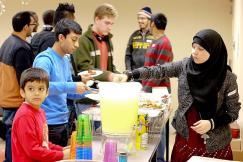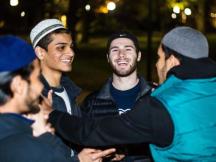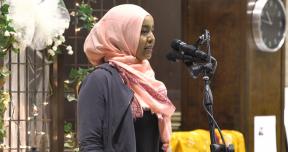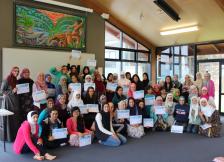
A leader must be a follower. A leader must have strong Iman. A leader leads himself and others in faith and practices of ibadah. A leader must be disciplined. A leader has taqwa – self-restraint and God-consciousness.
A leader has good character. That’s it. A leader possesses integrity, strength, knowledge and humility. A leader uses these qualities to influence and guide people toward achieving a common goal. Leadership encompasses a range of skills and behaviors that empower individuals to provide directions, motivate, make decisions and foster collaboration especially through shuraa.
Effective leadership requires skills like communication, strategic thinking and the ability to adapt. It is a social process where individuals work together to achieve results they could not have accomplished alone. Leadership is about taking action and leading by example to achieve a shared vision.
Essential skills of effective leaders typically possess strong communication, decision making and problem solving skills. They must also be adaptable, confident and capable of motivating others to perform at their best.
In Quran, Allah instructs us on the most excellent leadership in Suratul Azhab, ayah 21
Indeed, in the Messenger of Allah you have an excellent example for whoever has hope in Allah and the Last Day, and remembers Allah often.
As Muslims we follow the life example of Prophet Muhammad (Sallallahu alaihi wasallam) in all things.
In Islam whenever we have two or more people praying together, one must lead. This person is the Imam whether in a formal gathering or in the home. Those who follow him are muqtadi an Arabic word that literally means to follow or imitate. There is wisdom in the salah for the function of human life at home and in the society. Someone must lead. Someone must follow the example set by the Prophet Muhammad (Sallallahu alaihi wasallam) on how to pray, when to pray and what to say when they pray. That someone must have faith in Allah to be allowed to lead. That person takes the lead in himself to perform the prayer and leads others in the ibadah. That person is disciplined to pray on time iman. Someone who is leading himself and others in this ibadah.
Also deeply ingrained in Islam is the concept of taqleed which means to follow in accordance to the technical meaning used in the sharia. It means to follow someone in what he says, considering it to be the truth, without looking into the evidence for it. We do this when we follow the Imam in prayer in congregation and at home.
So far I have written more on a dictionary understanding of leadership. However, at this point I want to share how leadership expands all aspects of human life – the family and community. Mankind was created to lead. Refer to the first line in the ayah 30 of Suratul Baqarah, the second chapter of the Holy Quran:
˹Remember˺ when your Lord said to the angels, “I am going to place a successive ˹human˺ authority on earth...”
Thus, the human being is meant to lead.
In the home, sons follow the lead of their father. Father’s imitate the life example of Prophet Muhammad (Sallallahu alaihi wasallam). When raising children to be vicegerents on the earth that means teaching them to do good and to follow the straight path, a path not horizontal, but vertical. That means ever achieving higher good deeds. This means instilling honesty – being true to themselves and to Islamic values. Discipline – following through with ibadah and Islamic principles. Taqwa – fearing the displeasure and forever raising and improving the intellect and intention.
Leaders are both female and male. We must acknowledge gender differences and gender roles. In the Holy Quran Surah Al Imran ayah 36
“…and the male is not like the female…”
But that by no means that female are psychologically or intellectual inferior. Allah says in the Holy Quran Surah Tin ayah 4
“We have certainly created mankind in the best of molds”
For women this is more than just the physical beauty of their form, but the overall God-consciousness Allah has placed within them that allows them to lead as mothers, wives and citizens in the community. We need only look at the lives of the Mothers of the Believers to see examples of the leadership qualities within women – comforters, advisors, narrators of the words and actions of Prophet Muhammad (Sallallahu alaihi wasallam).
Allah has given both male and female equality when he states in tge Quran Al Mulk ayah 28
“It is He who created you made you grow and made for you the faculties of hearing, seeing, feeling and understanding”
Even as leadership derives from either gender, in Islam we understand that men have an additional duty that Allah has placed upon them. In the Holy Quran Surah An Nisa, ayah 34
“Men are the caretakers of women, as men have been provisioned by Allah over women and tasked with supporting them….”
We focus on the word fadl a word that means literally means surplus or abundance, but typically and culturally translated as grace or favor in paternalistic societies. We already understand that Allah has made the male and female different. In this instance the surplus or abundance that men have over women is strength – physical strength to be specific. In the simplest terms a husband is likely to be able to pick up his wife, even is she is above normal weight. Few wives can physically pick up their husbands. This ability to ‘carry’ is a form of leadership placed upon the men in Islamic societies – we carry the needs of our family – we support our wives, children and community.
This is only manifested with discipline and taqwa – which go together. Discipline and taqwa – God-consciousness are critical elements of strong moral leadership. The rituals of ibadah in
Islam are meant to be reminders but also to be synthesized within our own selves. Leaders know this way of life, this deen, practice it naturally and teach it to others. What is started in the home extends out to the community. The ummah depends on the Imam, its leader to be its cornerstone
Our ummah is about synergy so our imams leaders must realize how the whole is greater than the sum of the parts. Allah has made leadership an innate quality within the human being. We have to synthesize the God-consciousness and discipline to be the best leaders we can be. represent the knalifah state of mind that Allah planted as a seed in our core. May the peace and blessing of Allah be upon us all.
Bio: Qahir Abdur-Rahman is the Imam and designated religious group leader for Islamic affairs at US Army Garrison Fort Lee in Virginia. He has studied and gained certification on Quran Arabic from both U.S. and hafith scholars in Saudi Arabia, including Dr. Shaheed Coovadia and Hafeezah Aneesah Dawah of the Islamic Learning Institute (ILI). He is currently in the Islamic Learning and Leadership Training & Development Program. Since 2022 he volunteers to assist with reading and reciting one juz of the Quran each morning of Ramadan for the Islamic Learning Institute for an all-male study group.








Add new comment